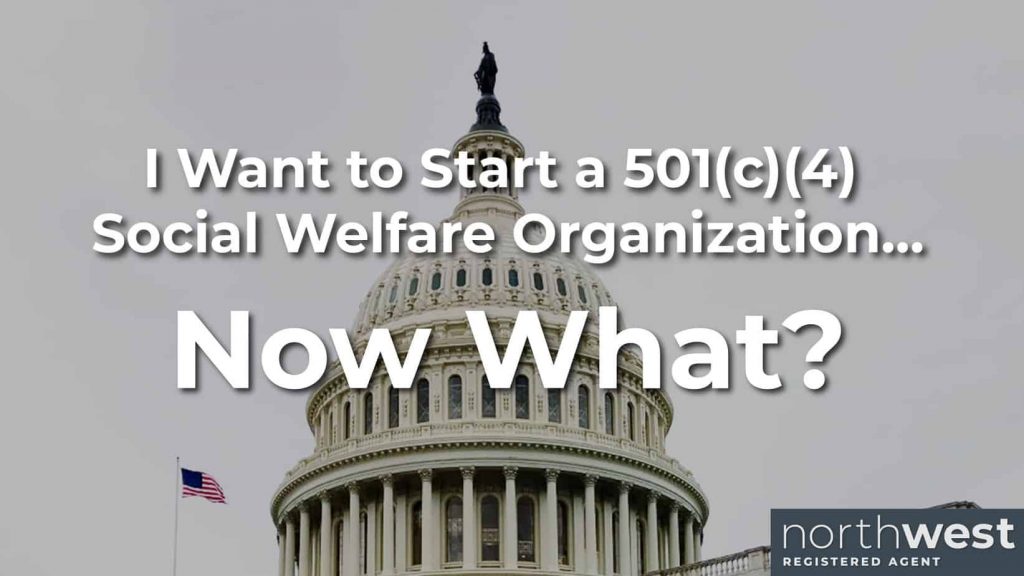I Want To Start A 501(C)(4) Social Welfare Organization… Now What?
A 501(c)(4) social welfare organization is a tax-exempt nonprofit that can make lobbying its primary activity and even engage in some political campaign activities. It’s an excellent choice for nonprofits that want to influence legislation without being hampered by the strict limitations the IRS imposes on 501(c)(3) charities, so long as the organization is confident that it can secure funding for its activities. Funding considerations are important, of course, because contributions to 501(c)(4) social welfare organizations, unlike donations to tax-exempt charities, are not deductible on donors’ tax returns.
Below, you’ll find an overview of the main steps to starting a 501(c)(4) social welfare organization. If you need to get clear about the IRS’s perspective on lobbying, refer to our related article titled “The IRS, Lobbying, and Your 501(c)(3) Public Charity.”
How to Start a 501(c)(4) Nonprofit
- File Articles of Incorporation at the State Level
To legally create your 501(c)(4) social welfare organization, you’ll start by forming the organization in your charter state (your home state). Though the information included varies a little from state to state, your articles of incorporation, or the equivalent state document, will include your nonprofit’s name, registered agent information, and statement of purpose. It’s important to organize your nonprofit in a way that will satisfy Section 501(c)(4) of the Internal Revenue Code, which includes ensuring that the organization’s earnings will serve its tax-exempt purposes and not serve to enrich its members. It’s best, of course, to seek qualified legal advice before submitting your articles to the state.
- Get an Employer Identification Number (EIN) from the IRS
All nonprofit corporations are required to get an employer identification number (an EIN) from the IRS. This is because your 501(c)(4) organization is (or will be) a distinct legal entity. You can apply for an EIN at the IRS website, by fax, or by mail.
- Meet, Appoint Directors, and Adopt Bylaws
Most states require nonprofits to hold an organizational meeting to complete the incorporation process. This meeting involves adopting nonprofit bylaws, appointing or electing directors and officers, and passing any necessary resolutions to truly complete the incorporation process.
- Submit IRS Form 8976, Notice of Intent to Operate Under Section 501(c)(4)
This step is required of all nonprofits seeking 501(c)(4) tax-exempt status, even if the organization also files Form 1024-A (see below), and it must be submitted within 60 days of incorporating. By submitting IRS Form 8976, your organization simply declares its 501(c)(4) status, and you can begin filing annual Form 990s without any further permissions from the IRS once it accepts your submission of Form 8976. You’ll submit Form 8976 online, and it comes with a $50 submission fee.
- Optional: Apply for 501(c)(4) Tax-Exempt Status with the IRS
Your 501(c)(4) social welfare organization also has the option to submit Form 1024-A to the IRS (called the Application for Recognition of Exemption Under Section 501(c)(4) of the Internal Revenue Code), which includes a $600 submission fee and takes around 3-6 months to process. Many 501(c)(4) nonprofits skip this costly step, but that could be a bad idea in the long run. It can be tough to know if your nonprofit is organized in a way that will truly satisfy the IRS unless you submit Form 1024-A and put your 501(c)(4) organization under the IRS’s microscope.
- File the annual IRS Form 990
Whether you simply self-declare your tax-exempt status or file Form 1024-A, your 501(c)(4) social welfare organization will need to file an annual information return with the IRS—Form 990, 990-EZ or an annual electronic notice depending on your nonprofit’s annual gross receipts.
Beyond the steps discussed above, your organization will need to apply for any relevant state business licenses and state tax exemptions, but these vary from state to state and are not described here. As you prepare to begin the formation process, also keep in mind that many states won’t grant the same state tax exemptions to 501(c)(4) social welfare organizations that they will grant to 501(c)(3) public charities.
How can you know if a 501(c)(4) designation is right for your nonprofit? Ultimately, deciding to start a 501(c)(4) social welfare organization depends on whether or not lobbying will make up a significant part of your nonprofit’s activities and if your organization intends to engage in political campaign activism. If this description doesn’t match your nonprofit’s purpose and likely activities, you might explore starting a 501(c)(3) public charity instead.
